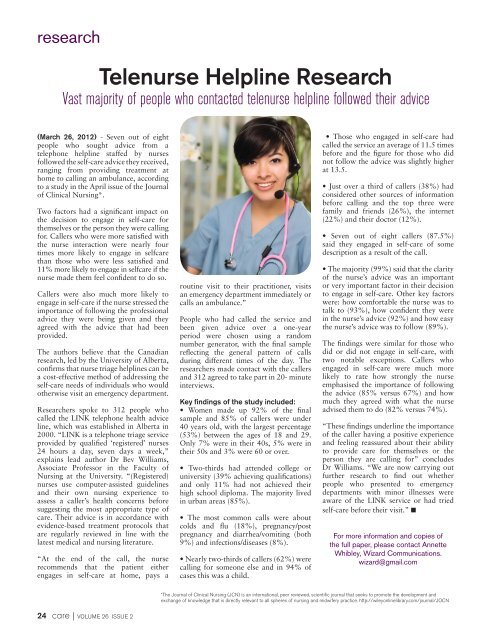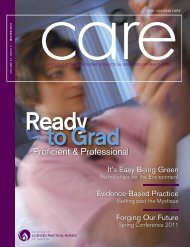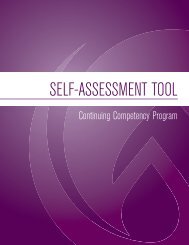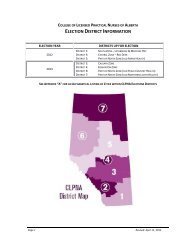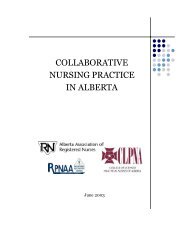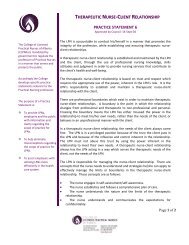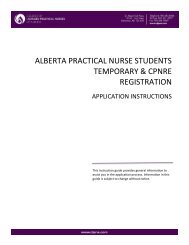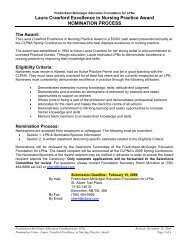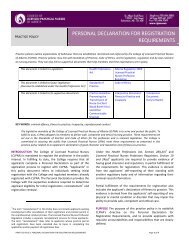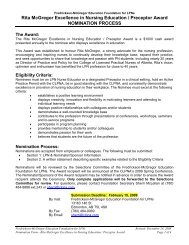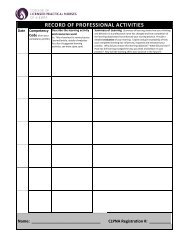Head, Heart & Hands-On Leadership - College of Licensed Practical ...
Head, Heart & Hands-On Leadership - College of Licensed Practical ...
Head, Heart & Hands-On Leadership - College of Licensed Practical ...
You also want an ePaper? Increase the reach of your titles
YUMPU automatically turns print PDFs into web optimized ePapers that Google loves.
esearchTelenurse Helpline ResearchVast majority <strong>of</strong> people who contacted telenurse helpline followed their advice(March 26, 2012) - Seven out <strong>of</strong> eightpeople who sought advice from atelephone helpline staffed by nursesfollowed the self-care advice they received,ranging from providing treatment athome to calling an ambulance, accordingto a study in the April issue <strong>of</strong> the Journal<strong>of</strong> Clinical Nursing*.Two factors had a significant impact onthe decision to engage in self-care forthemselves or the person they were callingfor. Callers who were more satisfied withthe nurse interaction were nearly fourtimes more likely to engage in selfcarethan those who were less satisfied and11% more likely to engage in selfcare if thenurse made them feel confident to do so.Callers were also much more likely toengage in self-care if the nurse stressed theimportance <strong>of</strong> following the pr<strong>of</strong>essionaladvice they were being given and theyagreed with the advice that had beenprovided.The authors believe that the Canadianresearch, led by the University <strong>of</strong> Alberta,confirms that nurse triage helplines can bea cost-effective method <strong>of</strong> addressing theself-care needs <strong>of</strong> individuals who wouldotherwise visit an emergency department.Researchers spoke to 312 people whocalled the LINK telephone health adviceline, which was established in Alberta in2000. “LINK is a telephone triage serviceprovided by qualified ‘registered’ nurses24 hours a day, seven days a week,”explains lead author Dr Bev Williams,Associate Pr<strong>of</strong>essor in the Faculty <strong>of</strong>Nursing at the University. “(Registered)nurses use computer-assisted guidelinesand their own nursing experience toassess a caller’s health concerns beforesuggesting the most appropriate type <strong>of</strong>care. Their advice is in accordance withevidence-based treatment protocols thatare regularly reviewed in line with thelatest medical and nursing literature.“At the end <strong>of</strong> the call, the nurserecommends that the patient eitherengages in self-care at home, pays aroutine visit to their practitioner, visitsan emergency department immediately orcalls an ambulance.”People who had called the service andbeen given advice over a one-yearperiod were chosen using a randomnumber generator, with the final samplereflecting the general pattern <strong>of</strong> callsduring different times <strong>of</strong> the day. Theresearchers made contact with the callersand 312 agreed to take part in 20- minuteinterviews.Key findings <strong>of</strong> the study included:• Women made up 92% <strong>of</strong> the finalsample and 85% <strong>of</strong> callers were under40 years old, with the largest percentage(53%) between the ages <strong>of</strong> 18 and 29.<strong>On</strong>ly 7% were in their 40s, 5% were intheir 50s and 3% were 60 or over.• Two-thirds had attended college oruniversity (39% achieving qualifications)and only 11% had not achieved theirhigh school diploma. The majority livedin urban areas (85%).• The most common calls were aboutcolds and flu (18%), pregnancy/postpregnancy and diarrhea/vomiting (both9%) and infections/diseases (8%).• Nearly two-thirds <strong>of</strong> callers (62%) werecalling for someone else and in 94% <strong>of</strong>cases this was a child.• Those who engaged in self-care hadcalled the service an average <strong>of</strong> 11.5 timesbefore and the figure for those who didnot follow the advice was slightly higherat 13.5.• Just over a third <strong>of</strong> callers (38%) hadconsidered other sources <strong>of</strong> informationbefore calling and the top three werefamily and friends (26%), the internet(22%) and their doctor (12%).• Seven out <strong>of</strong> eight callers (87.5%)said they engaged in self-care <strong>of</strong> somedescription as a result <strong>of</strong> the call.• The majority (99%) said that the clarity<strong>of</strong> the nurse’s advice was an importantor very important factor in their decisionto engage in self-care. Other key factorswere: how comfortable the nurse was totalk to (93%), how confident they werein the nurse’s advice (92%) and how easythe nurse’s advice was to follow (89%).The findings were similar for those whodid or did not engage in self-care, withtwo notable exceptions. Callers whoengaged in self-care were much morelikely to rate how strongly the nurseemphasised the importance <strong>of</strong> followingthe advice (85% versus 67%) and howmuch they agreed with what the nurseadvised them to do (82% versus 74%).“These findings underline the importance<strong>of</strong> the caller having a positive experienceand feeling reassured about their abilityto provide care for themselves or theperson they are calling for” concludesDr Williams. “We are now carrying outfurther research to find out whetherpeople who presented to emergencydepartments with minor illnesses wereaware <strong>of</strong> the LINK service or had triedself-care before their visit.” nFor more information and copies <strong>of</strong>the full paper, please contact AnnetteWhibley, Wizard Communications.wizard@gmail.com*The Journal <strong>of</strong> Clinical Nursing (JCN) is an international, peer reviewed, scientific journal that seeks to promote the development andexchange <strong>of</strong> knowledge that is directly relevant to all spheres <strong>of</strong> nursing and midwifery practice. http://wileyonlinelibrary.com/journal/JOCN24 care | VOLUME 26 ISSUE 2


